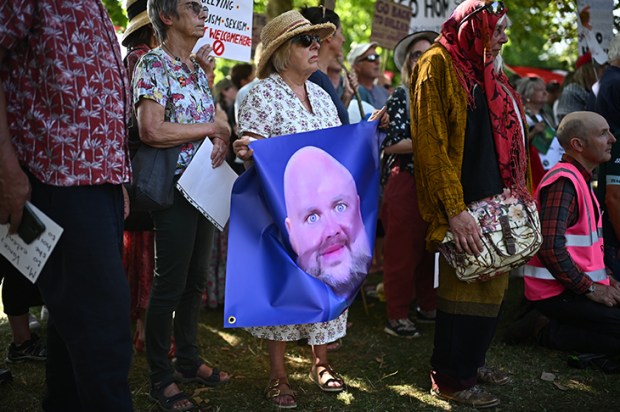‘Why didn’t they ask Evans?’ wrote Agatha Christie in 1934. Or, in this case, why didn’t they ask anybody?
In New Zealand a concept called co-governance signals a clear intent to assign control rights of some national institutions to Maori, who are persons that may claim any genealogical link to Polynesians who populated New Zealand around 1300 to 1400AD. Co-governance is not implied by the 1840 Treaty between the Crown and Maori. It is the result of parliament accommodating a concentrated voting interest that, under mixed member proportional representation (MMP), is driving social and economic change in New Zealand toward some authoritarian, even totalitarian model. New Zealand’s contemporary status as a democracy is at risk because parliament will not run a key binding referendum that is long overdue: why?
Since 1867, there have been two electoral constituencies that cover the country with different nationwide footprints; one for the general populace and one for Maori. Maori may choose to join the general electoral roll or the Maori electoral roll: about half choose the Maori roll. The complete electoral system includes both rolls. It has never been put to a public referendum.
The total number of Maori-specific seats is determined by the proportion of Maori that join the Maori electoral roll. If all Maori joined this roll the number of these seats would double from the present seven, at the expense of general seats.
Between 1867 and 1996 elections were by first-past-the-post (FPP). The 1993 referendum approving the switch from FPP to MMP did not test the opinion of the public about the Maori-specific seats; notwithstanding that FPP and MMP are fundamentally different in their allocation of political power. A royal commission considering the electoral system recognised this fact and suggested abolition of the Maori-specific seats in concert with the introduction of MMP.
MMP voters cast two separate votes: one for an individual and another for a party. MMP has a proportion of parliamentarians not directly elected but appointed by parties. The appointed persons are identified publicly prior to elections, and if their party is in parliament, they have law-making powers equivalent to those individually elected. In 2023, 41 per cent of all New Zealand lawmakers were party appointed.
MMP implies New Zealand government is a coalition of parties. Coalition formation is a dynamic process in which parties with broad national interests court special-interest groups in the electoral competition to form a coalition. Having the most votes does not guarantee a party presence in a coalition. Very often small, relatively narrow-interest parties are influential and determine the composition and agenda of coalition governments. Concomitantly, relatively small groups with purposeful, relatively stable, special-interest agendas switch party liaisons over time building on what has gone before and what support is on offer. MMP can be very effective in progressing concentrated interest agendas. It breaks any link between share of a group in the population and political power.
The share of Maori in the population is about 17 per cent. During the 30 years and 10 elections of MMP the proportion of parliamentary seats held by Maori has grown from approximately 7 to 27 per cent. In the 2023 election there were 122 total seats that included: seven Maori-specific seats, five general seats won by Maori, and 21 Maori appointed by general parties. A third of the appointed lawmakers are Maori. The Maori-specific seats have at various elections been in coalitions with the major parties National, or Labour, or provided the core of a separate Maori party.
The Maori population has diverse genealogy. Some are members of tribes with tribal-hereditary governance and interests: others have no active tribal affiliation. They have major differences in views and resource holdings. Maori has not had a national governance organisation. It does have a special-interest agenda promulgated by influential tribes and groupings that vary with issues.
Maori special interest consists of Maori and some non-Maori. Its complement, sometimes called the diffuse interest, consists of the people and groups that do not share the concentrated interests. It includes some Maori. New Zealand’s diverse multicultural population renders it difficult to effectively coordinate diffuse interests.
Maori special interest is coordinated by various institutions; some government-supported. Initially it was coordinated by the 1840 Treaty, and the Crown’s response to it. In 1987, the Treaty was agreed by Maori and the Crown in a New Zealand Court of Appeal decision to be that the Crown was sovereign and would govern and provide protections and law and order to all citizens; and could buy land from Maori. Maori would manage the land they did not transfer. Particularly since 1996 there has been promotion of legislation and administration that implies Maori control of aspects of New Zealand citizens’ lives and arrangements that go beyond these terms.
A good example is the Water Services Entities Act (2022) designed to regulate water management of private and public land. It provided that managers be appointed by boards that were 50-per-cent Maori, in turn appointed by tribes. Called ‘co-governance’, these boards sat on top of bureaucracies called entities and chose management that was required to implement local Maori opinion on water issues. Co-governance is most accurately described as Maori governance, because it has sufficient Maori members for them to veto any potential board decisions, and hence choose managers that accord with Maori interests.
The legislation was enacted by a Labour government that held six of the seven Maori seats. It reveals both the desire of Maori special interest to have institutional authoritarian control over the actions of citizens, and a political willingness to accommodate it. While in 2023 the incoming coalition government rescinded the Act it too faces the same political pressures and may consider that there should be some place for co-governance. Beyond parliament, Maori use court action to progress controls they seek. An active case being defended by the government may affect future co-governance of water regulation.
If New Zealand were truly a multicultural democracy it would have at some time in its history – most particularly when introducing MMP – applied a binding referendum to the question of the existence of the Maori-specific seats. Whatever the outcome, such a referendum would yield an electoral system approved by citizens, and increase respect for parliament.
Why has the question not been asked? In Why didn’t they ask Evans? the answer was to protect a conspiracy. For the electoral question, the answer must include ongoing far-reaching effects of political incentives created by the rules of the electoral system untested by the populace. These incentives perpetuate a system that, on the evidence, is supporting a path to authoritarian control.
Got something to add? Join the discussion and comment below.
You might disagree with half of it, but you’ll enjoy reading all of it. Try your first month for free, then just $2 a week for the remainder of your first year.












